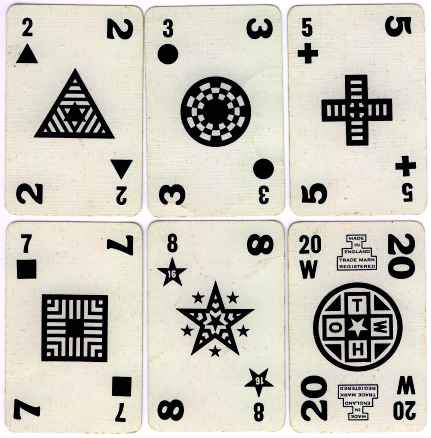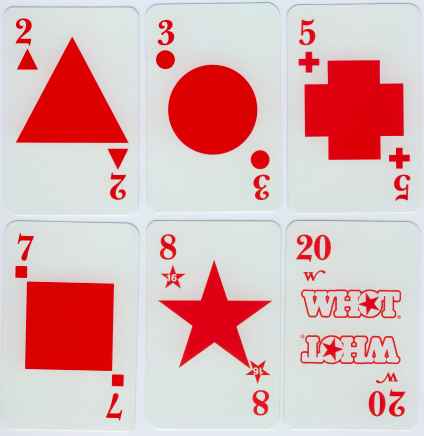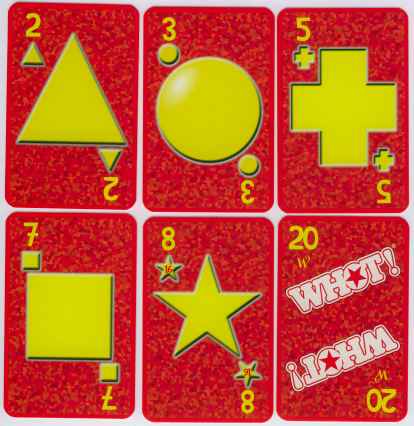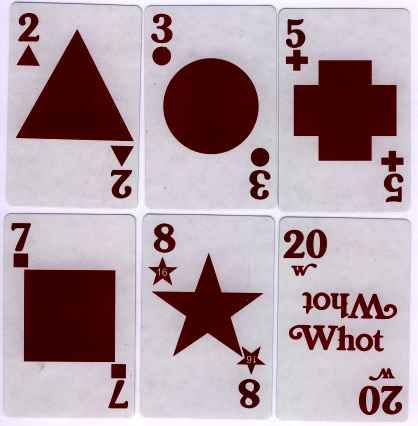Whot!®
- Introduction
- Players and Cards
- Deal
- Play
- End of Play and Scoring
- Variations
- Nigerian Whot
- Other Whot! web pages
Introduction
| Illustrations of Whot card designs. |
|---|
|
|
|
|
Whot! was one of the earliest commercial games based of the Eights family, in which players try to be the first to get rid of their cards by following number or suit. Whot! was invented (but, apparently, not patented) and trademarked by William Henry Storey, of Southend-on-Sea, England in 1935. It was first marketed by the company Storey & Co of Croydon, which he set up in 1930, but was soon acquired by Waddingtons of Leeds, and was popular in Britain in the 1950's and 1960's. Waddingtons continued to sell it until the 1990's; nowadays it is distributed by Winning Moves UK in their Top Cards series.
Whot! has become the national card game of Nigeria. On this page, the British version of the game is described first, followed by the Nigerian version.
Players and Cards
There can be two or more players. A special pack is used, consisting of five unequal suits identified by symbols (circle, triangle, cross, square, star) and some wild "Whot" cards. The composition of the suits is as follows.
| Circles | 1 | 2 | 3 | 4 | 5 | 7 | 8 | 10 | 11 | 12 | 13 | 14 | ||
|---|---|---|---|---|---|---|---|---|---|---|---|---|---|---|
| Triangles | 1 | 2 | 3 | 4 | 5 | 7 | 8 | 10 | 11 | 12 | 13 | 14 | ||
| Crosses | 1 | 2 | 3 | 5 | 7 | 10 | 11 | 13 | 14 | |||||
| Squares | 1 | 2 | 3 | 5 | 7 | 10 | 11 | 13 | 14 | |||||
| Stars | 1 | 2 | 3 | 4 | 5 | 7 | 8 | |||||||
| Whot! | Four or five cards, numbered "20" in some packs. | |||||||||||||
Early Whot! packs had five Whot! cards, making a 54-card pack, and this format is still used in Nigeria. Some time around 1990, the number of Whot! cards in British packs was reduced to four, making a 53-card pack.
Note: Star cards count double when scoring. To help when calculating the score, the star cards in most packs show two numbers: the large number is the number of the card, used in play; the small number is the point value of the card, used in scoring.
Deal
Deal and play are clockwise and the turn to deal passes to the left after each hand. To choose the first dealer each player cuts the shuffled pack. The player who cuts the lowest card deals, Whot cards counting 20 for this purpose. The dealer shuffles and the player to dealer's right cuts. The dealer deals 6 cards to each player, one at a time, and puts the rest of the pack face down to form a draw pile.
Play
The player to dealer's left begins by playing any card from their hand face up to start a play pile.
Subsequent players at their turn may play one card face up on top of the play pile, if they have a card that fits. When the previous play was a card of one of the five suits, the possible plays are:
- any card with the same symbol (suit) as the previous play;
- any card with the same number as the previous play;
- any "Whot" card.
When a Whot card is played, the player must name a suit (symbol). The next card played must be a card of the named suit or another Whot card.
Note: the small numbers of the star cards (if present) and the number 20 on the Whot cards are ignored during play - they are relevant only for the final scoring. small number in the star is used only for scoring later.
If you cannot or do not wish to play a card at your turn, you draw one card from the draw pile instead; having drawn a card, you are not allowed to play a card on this turn.
If the draw pile runs out, all except the top card of the play pile are shuffled to form a new draw pile, and play continues.
Scoring
The play ends when a player wins by getting rid of all their cards. The other players score penalty points for the cards left in their hands. Circles, squares, crosses and triangles count face value, stars count double (the penalty value is usually printed inside the small stars), and Whot cards count 20.
Players who have 100 or more penalty points drop out. The last player left in is the winner.
Variations
The rules supplied with the cards also describe a short game without scoring: there is just one deal and the first player to get rid of all their cards is the winner.
Nigerian Whot
In Nigeria the shapes (suits) are called ball, angle, cross, carpet, and star. The basic rules are similar to the British printed rules, but some of the cards have special effects, which vary a little from place to place:
| Card | Effect | Explanation |
|---|---|---|
| 1 | HOLD ON | The same player plays again. |
| 2 | PICK TWO | The next player must either play another two, or must draw two cards from the stock instead. If two or more consecutive players play twos, the first player who does not play a two must draw two cards for each consecutive two that was played (four cards for two twos, six cards for three twos, etc.). After cards have been drawn for the two(s), the next player can play any legal card. |
| 5 | PICK THREE | The next player must either play another five or must draw three cards from the stock instead. If two or more consecutive players play fives, the first player who does not play a five must draw three cards for each consecutive five that was played (six cards for two fives, nine cards for three fives, etc.). After cards have been drawn for the five(s), the next player can play any legal card. |
| 8 | SUSPENSION | The next player misses a turn. If the STAR 8 is played, the next two players must each miss a turn. |
| 14 | GENERAL MARKET | All players except the person who played the 14 must immediately draw one card from the stock. |
Note that in a two-player game, there is no difference between "HOLD ON" and "SUSPENSION" since there is only one opponent to skip. In the multi-player game, the use of the 1 and 8 varies. Some play that "HOLD ON" means that just the next player misses a turn, while "SUSPENSION" causes all the other players to wait while the player of the 8 plays another card.
The next card played after a "HOLD ON" or "SUSPENSION" has to follow the normal rules - it must have the same symbol as the 1 or 8, or the same number (causing another hold on or suspension) or a wild 20 (whot) card accompanied by a call for the shape that should be played next.
A player whose hand is reduced to two cards must warn the other players by saying "semi last card". A player with just one card must warn the others by saying "last card". A player who omits these warnings is penalised by drawing two cards from the stock.
With thanks to Henry Ogungbile, Gina Odichukwumma, Jared Long, Kassim Adewale and others for explaining this version of Whot to me.
Israel Ameh tells me that in the 1970's and 1980's, Nigerian Whot was played with only two special cards:
- 1 - Hold on - The same player plays again and can play any card he/she desires. If the player has only two cards left, he/she can end the game by playing the 1, saying "hold on", then saying "last card" and then check up.
- 4 - Pick two - Every player except the one who played the 4 must draw two cards from the stock. (Even if the 4 is played as the winner's final card.)
The 2's, 5's, 8's and 14's had no special function in this version.
Other Whot! web pages
Gamecatalog.org has a scan of the Storey and Co Whot! rules from the 1930's.



